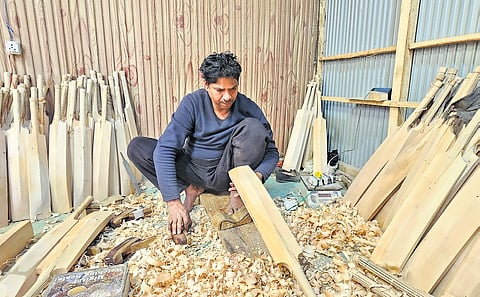

J&K: Fawzul Kabir from south Kashmir’s Anantnag is getting the Valley its much-deserved place on the international stage. Through his company, GR8 Sports India Pvt Limited, he’s producing world-class cricket bats now wielded by about 50 international players in both men’s and women’s circuits.
“Kashmir has been supplying raw materials for bat manufacturing for over 100 years, yet these bats were rarely marketed as a Kashmiri brand to international customers. The companies used to take our willow and rebrand it as their own,” Kabir recalled.
In 2010, he set out to change this. Wanting to see a Kashmiri brand alongside the likes of Gunn & Moore, Kookaburra and SG, he, over the next decade, travelled to all the test-playing nations, met players, coaches, umpires, groundstaff, craftsmen and experts to take their insights and even upgraded his manufacturing unit to international standards. As Kabir had no financial backing from anywhere, he sold his nearly 40 kanals (about 4 acres) of land and other assets to fund his mission.
Finally, in 2021, ICC gave its approval to Kabir’s bats, meeting all the international standards.
The bat quickly made its mark. In the same year, five Oman players used GR8 bats in the 2021 T20 World Cup. It was the first time that a Kashmir-produced bat was being used on the international stage under a Kashmiri label.
Then, the next year, it had its moment under the sun when UAE player Junaid Siddique hit the longest six (109 meters) of the 2022 T20 World Cup against Sri Lanka.
“The longest six turned historic moment for Kashmir bats…I began to receive emails from different parts of the world and they were interested in buying the Kashmir bat,” Kabir said.
“From no exports till 2020, 35,000 bats were exported in 2021, 12.5 lakh in 2022, and last year the figure stood at 2.47 lakh. This year so far we have exported 3.50 lakh Kashmir bats,” Kabir added.
And, these bats are now being exported to cricket-playing nations, including England and Australia.
According to Kabir, the Kashmir willows have hit a sweet spot with their lighter weight, power and affordability, which is driving their sales.
The bats have also featured in the hands of the yesteryear players in this year’s Legends League Cricket (LLC).
Today, about 400 factories in Kashmir produce 3 million bats annually. The process of making bats starts with willow trees, which take about 15 years to grow. Once harvested, the wood is transported to factories where it is cut into logs and then shaped into bat clefts. Skilled craftsmen then carve the clefts into bats and the use of technology and craftsmen’s fine touches and tunings turn these bats into world-class bats.
As the government has taken steps for the plantation of willow saplings on a large scale to support the bat industry, Kabir hopes the now-emerging bat industry can provide employment and engage local youth positively, offering an alternative to drug abuse through involvement in sports activities.